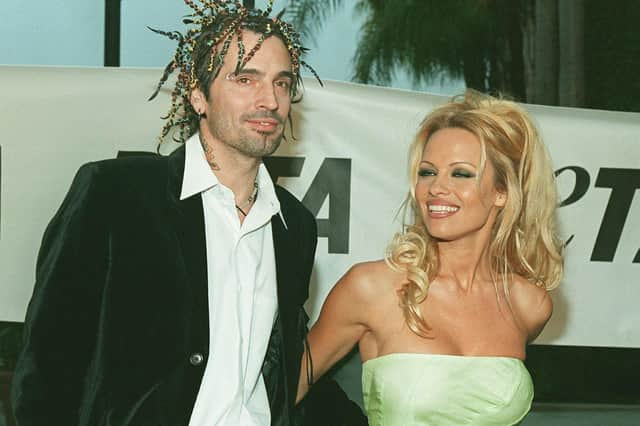Disney's Pam & Tommy may be 'based on' fact, but should be viewed as fiction – Alastair Stewart


Anderson's life was irrevocably changed when someone broke into the home she shared with then-husband Tommy Lee, stole a private sex tape, and released it without their consent.
It has been widely reported that Anderson's inner circle fear she is being re-traumatised by depicting the incident. But once again, someone else's suffering is disguised as legitimate entertainment. The former Baywatch star had no involvement with the show.
Advertisement
Hide AdAdvertisement
Hide AdIt is a radical notion for some to believe that Anderson is anything but a pin-up sex symbol. But sex object is a perhaps better description if audiences never thought a woman whose privacy was so egregiously violated would feel devastated and degraded. In reality, she is a human being and mother.
Is there an explanation for how we can turn a convenient blind eye while tuning in every week?
There's a psychological phenomenon known as the Mandela Effect. It purports to explain how people can sometimes share false memories. It was named by researcher Fiona Broome, who claimed she and thousands of others collectively recalled, wrongly, that Nelson Mandela had died tragically in prison in the 1980s.
Anderson's sexuality was a conscious choice, her Playboy appearances a career decision. That there is a conflation in pop culture between her work and the spoils of home invasion is tantamount to calling her a slut who deserved it.
A similar event took place in 2014 when a collection of almost 500 explicit private pictures were hacked from celebrity iCloud accounts. Jennifer Lawrence, who suffered a similar humiliation as Anderson, equated it to a never-ending violation.
Pam & Tommy is not just the first post-MeToo programme but an examination of how far biopics can reasonably go before they gratuitously infringe on the lives of living subjects. The script is less a cliché and more a mirror to our hypocritical attitudes.
The show itself presents Anderson as the scrappy underdog continually rewarded for her looks, who has to fight to prove she can be much more. In the eponymous episode 'Jane Fonda', Anderson praises the activist and actress as a measured idol because she combines sexuality and innovation as a respected artist.
And yet the whole story of their stolen sex tape is billed, treated and presented as a damn good ruckus. The acting is only possible because of a superhuman application of transformative prosthetics – there’s a talking animatronic penis, for good measure (voiced by Jason Mantzoukas).
Advertisement
Hide AdAdvertisement
Hide AdEven if the aspiration is for authentic storytelling, when do stories become public property, and when does entertainment become exploitation?
In Anderson's case, she claims to have never made any money from it. Selling the life rights to a story is not necessarily a guarantee that it will do its subject any favours, anyway.
‘Biographical drama’ has as much creative licence as ‘historical drama’. Others can be infamously ‘based on’ or ‘inspired by’ and get it wrong or deliberately present a loaded narrative.
Biopics like J. Edgar (2011) prominently feature allegations of cross-dressing and a relationship with Hoover's long-term associate Clyde Tolson.
Churchill (2017) with Brian Cox was one of the worst blunders in the genre. Films have to take liberties with the truth, but warping them into a counter-factual narrative – in this case about Churchill's alleged incompetence over D-Day – is absurd.
The Founder (2016) tells the cutthroat origin story of McDonald's (and was also written by Robert Siegel, who writes for Pam & Tommy). The story of the fast-food restaurant chain condenses, insinuates and accuses with wavering accuracy.
Many other movies and TV shows purport to tell a story but know it will be taken as the truth. Even if there's a lazy approach to the facts and dates, its heart and premise are what audiences can see.
The clear issue with Pam & Tommy is there is little room for such nuance. The twin traumas of what happened to Anderson and its portrayal put too much pressure on the public to try and figure out events that happened a long time ago.
Advertisement
Hide AdAdvertisement
Hide AdImpeachment: American Crime Story, starring Clive Owen as Bill Clinton, treats Monica Lewinsky as a kite stuck in political storms. Lewinsky herself was a producer on the show, probably explaining why there is more emphasis on unearthing humanity than indulging political chicanery.
The likes of The Crown has been criticised for its presentation of members of the Royal Family. There have been broad accusations and concerns the show is making facts out of fiction. Prince William was frustrated that the BBC had been helping Netflix “commercialise” Princess Diana's infamous Panorama interview.
Older biopics like Lincoln or Patton are much easier to nitpick, for there are tomes of history to tick off what did and did not happen.
But events on the pop culture fringe (say the last three decades) will be plagued by ambiguity because their protagonists are still alive. And those people, and their families, can be hurt.
The grey area of when – legal rights aside – public personality becomes public ownership is dubious. Even if it is a question of taste, it seems obvious but necessary to slap a 'fictional' warning sign on the likes of Pam & Tommy.
There may not be any correct answer to it, but Dostoyevsky had a point when he said: “It is better to be unhappy and know the worst, than to be happy in a fool's paradise.”
A message from the Editor:
Thank you for reading this article. We're more reliant on your support than ever as the shift in consumer habits brought about by coronavirus impacts our advertisers.
If you haven't already, please consider supporting our trusted, fact-checked journalism by taking out a digital subscription.
Comments
Want to join the conversation? Please or to comment on this article.
